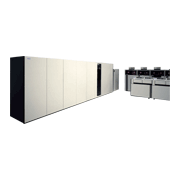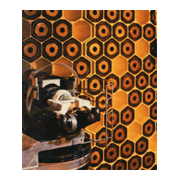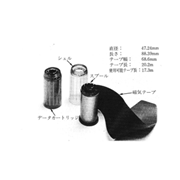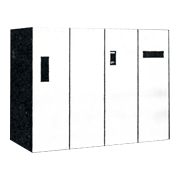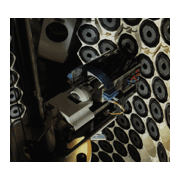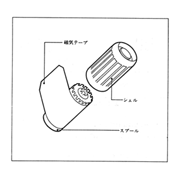Completed in 1980, the FACOM 6450 was a mass storage system (MSS) from Fujitsu which used 50MB cartridge tapes as a secondary storage hierarchy. With the advancement of the information society, there was a strong need for a memory system enabling direct access and integrated management of large amounts of data. This system was developed to meet this need by introducing automatic warehousing of magnetic tape and the concept of a virtual disk. It thereby improved efficiency and reduced labor in data processing.
The basic features of this system were as follows:
- (1) The system could house maximum 9.440(minimum 706) data cartridges (Note) each having a capacity of 50MB, and thus could store maximum 472(minimum 35) Gbyte of data. This corresponds to maximum 4,720(minimum 350) disk packs for the FACOM 478 (100MB each).
- (2) Data was processed by having a robot transfer cartridges, when necessary, from the cartridge library section to the read/write device.
- (3) Two cartridges were handled as a single 100MB volume, which was virtually controlled in a fashion equivalent to a disk pack for the FACOM 478.
- (4) When the data requested by the CPU was located on the actual magnetic disk, it was read into the CPU as is. If it was not on the magnetic disk, the necessary data was read off the cartridge, moved temporarily to the magnetic disk, and then transferred to the CPU.
- (5) This control was done using the host operating system and MSS hardware, and did not require human intervention.
- (6) The MSS could be used simultaneously by up to a maximum of 4 CPUs, and thus was ideal for high-volume data processing. The system was also designed with dual components for enhanced reliability, and thus was useful for building integrated online databases with no human intervention.
(Note) The cartridges housed magnetic tape with a width of about 7cm and length of 20m in a cylindrical case with a diameter of about 5cm and a length of about 9cm.
In 1984, Fujitsu completed the FACOM 6460 Cartridge Library System as a successor of this system. The FACOM 6460 used newly developed special data cartridges having a memory capacity of 150Mbyte, and was developed in order to achieve better economy, easier adoption and management, and higher reliability. The FACOM 6460 was specialized for backup applications and was not equipped with a virtual magnetic disk mechanism. The FACOM 6450 and 6460 used special-purpose data cartridges, but they developed later into library systems employing cartridge tape media used in tape units.
| Model name | FACOM 6450 Mass Storage System |
FACOM 6460 Cartridge Library System |
|---|---|---|
| Completion date | 1980 | 1984 |
| Cartridge type | Special-purpose data cartridge (Cylindrical case) | Special-purpose data cartridge (Cannonball-type case) |
| Cartridge memory capacity | 50Mbyte | 150Mbyte |
| Max. number of stored cartridges | 706–4,720 (*1) | 314–1,256 (*1) |
| Max. memory capacity | 35–236GB (*1) | 47–188GB (*1) |
| Data transfer speed of data cartridge |
Instantaneous max.:874KB/s Effective:371KB/s |
Instantaneous max.:1.75 MB/s |
| Average access time | 8–13s | 3s |
| Load/unload time | 5s max. for both | 5s for both |
| Number of connectable channels |
4 channels max. (MXC) (*2) |
8 channels max. (BMC) (Max. 4 channels per controller) |
| Remarks |
|
|
*1: Maximum varies depending on equipment configuration.
*2: Transfer of data from/to the CPU is executed between the channel (BMC) and staging disk controller to which the disk pack unit for staging is connected.


